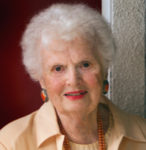By Natasha Josefowitz, ACSW, Ph.D.

LA JOLLA, California — There are two possible ways of behaving when coming into a new environment if one stands out for some reason—like being the only woman, the only foreigner, or someone with different skills. One can try to blend in and fit oneself into the prevailing culture, which may be difficult or not even possible. The other way is to accept the differences instead of hiding them, flaunt them by being even more of an outlier.
In the 1960s, I was the odd woman out in Switzerland as I was the only person with a master’s degree in clinical social work who was also able to teach the principles of casework (study, diagnosis, treatment). The Swiss social workers had heard of casework and were curious about it. So when I answered an ad for a social worker position at the local child-guidance clinic (Office Medico Pedagogique), I was interviewed and offered the job. The clinic had a psychologist who tested the children and a psychiatrist who treated them; the social worker was to deal with the parents of these children.
Therapy in Switzerland was based on an authoritarian model. The social worker is the professional and knows best. Case work is the opposite: one starts with where the client is—not where the client should be—and involves the client in a discussion, heeding their opinions, feelings, and thoughts and considering their environment, families, and jobs because all of these things impact their lives and their problems.
I would examine with them both the obstacles and the support available in order to solve whatever problem they came in with. In other words, the social worker did not have the answers; the clients would come up with the answers through this therapeutic process. Clients and social workers were partners in diagnosing the problem and finding a solution. This method was accepted cautiously at first, but was eventually endorsed by the child-guidance clinic.
By this time my daughter had graduated from high school and left for college in the U.S. With his sister gone, my son decided to board at his school. With no children at home and a husband who traveled extensively, I seized the opportunity to increase my training and teaching skills.
I met the well-known psychoanalyst Dr. René Spitz in Geneva. We became friends. He invited me to be part of his seminars for psychiatrists and psychologists; and so I took the evening train to Geneva to attend his weekly sessions. It was a wonderful opportunity to be a part of this group to hear them discuss their cases.
My consulting work was also taking off. I worked with a variety of organizations, such as the staff of a home for delinquent youths, another dealing with the developmentally disabled, and a group of Protestant ministers. I spent two full afternoons a month for a year with the juvenile court judges of French-speaking Switzerland and the city administrators of the Canton de Vaud. I also taught supervision for supervisors in training at the Geneva School of Social Work from 1972 to 1974. In addition, I taught interviewing techniques to fourth-year psychology students at the Applied Psychology Institute of the University of Lausanne.
All this was both exciting and scary. In order to validate that I was on the right track, I had members of the group take responsibility for their own education. Following each session, I would ask the group to share their impressions of what worked for them and what didn’t. We became partners both in their learning and mine. This model, new to all participants, appeared to work well, and I was receiving more requests for my consulting services.
For some much-needed respite, we bought a small chalet in the picturesque village of Gstaad in the Swiss Alps. With my husband’s constant traveling, I spent many long weekends alone there skiing. I would take a guide, and we would go up to the end of the ski lift and then walk up to the top of the mountain. The rest of the day was spent skiing downhill through pine forests and unmarked trails in powder snow; it was a transcendental experience. I also went cross-country skiing with my big black German shepherd, Kaleph (dog in Hebrew). We shared fresh-baked country bread with local cheeses. Bliss!!!
This was my life in Switzerland…until an unforeseen encounter upended my life.
© Natasha Josefowitz. This article appeared initially in the La Jolla Village News. You may comment to natasha.josefowitz@sdjewishworld.com